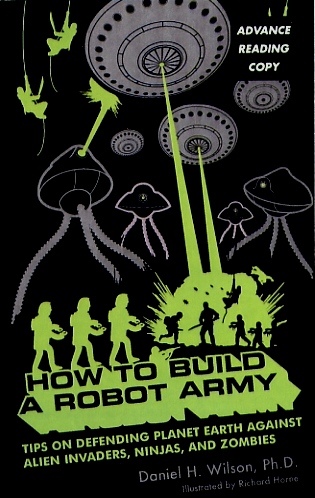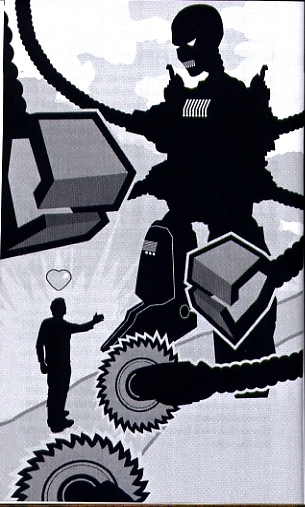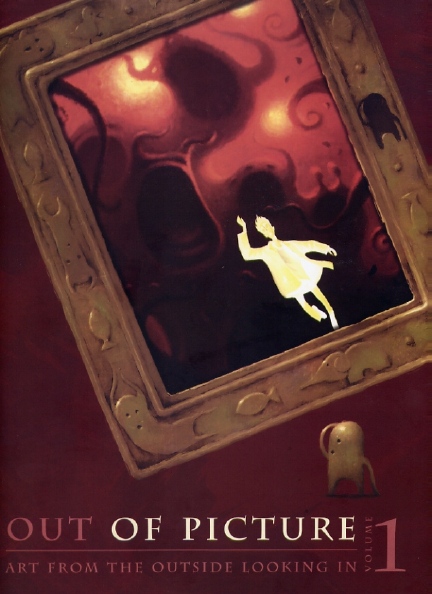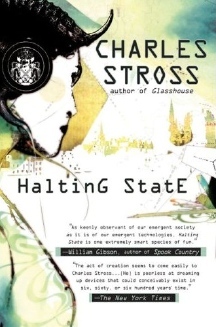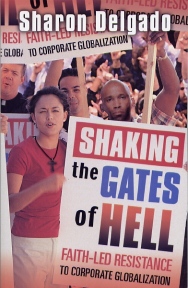|
|
|
|
This Just In...News
From The Agony Column
|
| |
|
12-28-07: Daniel H. Wilson Ph.D. Wants YOU to Know 'How
to Build a Robot Army' ; Agony Column Podcast News Report : Isabel Allendé Remixed
|
Some Assembly Required
|
|
Saving
the damn world whether or not it's desserved. |
There's nobody doing anything quite like Dr.
Daniel H. Wilson, and he continues
his collaboration with illustrator Richard Horne in 'How to Build a Robot
Army : Tips On Defending Planet Earth Against Alien Invaders, Ninjas
and Zombies' (Bloomsbury ; January 2008 ; $13.95). Combining straight-faced
goofy humor, a bit of hard science speculation, out-and-out media-based
science fiction and highly-stylized illustrations, these books pretend
to be guides to one thing when they're really guides to something rather
different.
What this book looks like is, well, exactly what the title states it
to be; a guide to building a robot army, etc, etc. There's a "BRIEFING" ("As
the enemies of Earth multiply, brave scientists are developing new robot
allies to shield our tender human bodies from insensate evil."), there
are sections on "How to Weaponize a Robot Vacuum," "How
to Supercharge Your Body With Micro-Robots," "How to Command
Robot Minions in Battle," and even the ever-necessary, "How to
Explore Mummy Infested Territory." And each of these sections is likely
to contain kernels of actual technological information, cultural observations
or informed speculation, all played for straight-faced laughs.
|
|
Nice
robot. Friendly robot. |
Horne's illustrations
are an integral aspect of this enterprise. This is his third book with
Wilson and to my mind, his illustrations are getting
better and better. Here, they retain their iconic simplicity yet include
more entertaining details, more visual jokes and fillips that refer to
and extend the text. Layout and design are equally important. Large type
and lots of white (or black) space lead the eye from one page to the next.
'How to Build a Robot Army' is pretty hard to put down.
For all the mock seriousness, serious humor and pop-cultural data-mining,
'How to Build a Robot Army' is a rather sophisticated enterprise. It's
clearly science fiction of some sort, but not a sort we've seen beyond
Wilson's other two books, 'How to Survive a Robot Uprising' and 'Where's
My Jetpack?' There's another aspect to this book as well, which is that
it's written simply enough so that younger readers immersed in a world
of video games and "SciFi" TV might well latch on to it. Here's
a way to lead a young mind down the path to perdition, ruin and computer
programming, assuming there's a difference.
I like Wilson's books and his collaboration with Horne. By now you should
have a pretty good idea as to what they are doing and why; the good news
is that they're getting better. Imagine one of the sort-of scary "*
{Trek, Wars}" manuals with a self-analyzing sense of humor. If the
mere thought of such materials does not drive one as mad as a glimpse at
Azazoth, The Crawling Chaos introduced by the SCIENCE FICTION writer H.
P. Lovecraft,
then perhaps the stars are indeed right.
|
Agony Column Podcast News Report : Isabel Allendé Remixed : Burying
Freedom
|
|
"We
were burying freedom." |
Long ago, when
Isabel Allendé released her autobiography, 'My Invented
Country', I engineered Kathryn Petruccelli's interview with this author.
It was 2003, and the country was still reeling from the attack on 9/11/2001.
As I sat listening to the author speak, her words, the timbre of her voice
struck me as immensely powerful. In my then-copious spare time, I worked
with Billy C. Reed (guitars) and Dan Ranalli (percussion and production) to create a sort of remix of that interview. Here's
the MP3 to usher in a long weekend leading to a new year.
|
| |
|
12-27-07: 'Out of Picture Volume 1' ; Agony Column Podcast
News Report : A Conversation With Lou Anders, Editor of Pyr Books
|
No Words Can Express
Some stuff doesn't boil down to words; it cannot be condensed into a simple,
pithy sentence. I'm looking at 'Out of Picture Volume 1' (Villard Books
/ Random House ; December 26, 2007 ; $19.95), and there are images in
there that convey a whimsy, a wistfulness, a sad understanding of this
horrific world and I'm still not nailing with all those words, what it
does. But perhaps I can give you an idea of what it is.
Apparently, the folks who work at Blue Sky Productions, the art group
behind movies like Ice Age and Robots, needed something to do in their
spare time.
This reminds me of Stanislaw Lem's literary computers that translate books
from one language into another; they’re so high-powered that they
have to be left on and when they're not translating great works by Dickens
into Russian they're creating the great works that Dickens never wrote.
Apparently Dice Tsutsumi and Vincent Nguyen were carpooling home one night
and decided to do a little project with all their buddies. Everyone would
write and illustrate a short, simple story, "Maybe in black and white?" according
to the jacket flap.
The result is rather more than a little side project. The title, 'Out of
Picture' is a film term for stuff that ends up on the cutting room floor,
but many of these little pieces are much more powerful than the average
Hollowood effort. "Newsbreak" by Michael Knapp, for example is
a stunning piece of work, an evocation of our fears and the love that keeps
us from falling apart. "Domesticity" by Vincent Nguyen evokes
the same themes with a very different story and imagery. Other pieces are
feats of high imagination, like Andrea Blasich's "Yes, I can" or
David Gordon's chilling and very surreal "The Wedding Present." Storytelling
here is very visual and succinct in the mostly self-contained pieces herein.
Some works are launchpoints or trailers for longer pieces, like such as
Greg Crouch's "Four and Twenty Blackbirds" or Daniel López
Muñoz's "Silent Echoes". Given that this is titled "Volume
1", we can hope to see these stories continued, within future volumes
or "out of picture" as it were.
None of this would be worth a fig if it weren't printed so nicely. The
majority of the art looks something like what you'd find in the finest
children's picture books, but shades darker, with a more fluid and complex
layout. Some of the stories might be fun to read to younger children, but
the brace are best served by adult attentions. The gorgeous colors, the
fine surreal sensibilities at work here are commanding and intelligent.
Better still, this is the sort of book that one hopes will sell itself
well in-store – particularly in some of those managed by the folks
I've been talking to in the past couple of months. It's perfectly designed
for this. You can easily pick it up, leaf through it and see how totally
cool the printing and production values are and read a couple of stories
that will hook you -- but not enough to make you leave the store without
the book. My take is that those inclined to pick this up will not want
to let it go. It's superb art, powerful storytelling, highly original and
has pristine production values. At twenty bucks, it's steal, so no need
to steal it. Just get it now and prepare to be blown away.
|
Agony Column Podcast
News Report : A Conversation With Lou Anders, Editor of Pyr Books : "The
Future is happening faster and faster all the time"
I just got off the phone
with Lou Anders, the editor for Prometheus Books' SF imprint, Pyr, and like
Tim Holman, he's really bullish on the future of
science fiction. He tells me in
our MP3 interview about some future offerings
from Pyr, and his unexpected entrée into the world of SF. He also
emailed me the answer to a question I asked which we sidelined away from,
to wit:
"Realized I never answered your question about my extracurricular activities.
Basically, Prometheus views my out-of-house anthos as good PR back to Pyr.
With only 19 to 20 books a year, I don't want to do more than one antho a
year in-house, but I love short stories and want to do more."
We'll be talking again soon, taking SF at the movies to task. Stay tuned!
|
| |
|
12-26-07: Agony Column Podcast News Report : A Review of
'Halting State' by Charles Stross
|
Does It Always Have to Be All About You?
Today's podcast is an
audio version of my review of 'Halting State' by Charles Stross. You
can hear the MP3 audio from this link, or read
the original prose review here. Stross works in so many genres and
disciplines, he's tough to keep up with. But if you've not read Stross,
this might
not be a bad place to start. We'll see how this book looks some ten years
from now, when the time it describes arrives. But always remember this
about science fiction – it's prose, not prediction.
|
| |
|
12-25-07: A 2007 Conversation With Eddie Fung and Judy Yung
|
'The Adventures of Eddie Fung: Chinatown Kid, Texas Cowboy,
Prisoner of War'
Every time you
think you know history something comes along to surprise you. How
could one life encompass a Chinatown childhood, teen years as
a Texas cowboy, incarceration in one of the most notorious prison camps,
involvement in building a bridge immortalized (and largely fictionalized)
by Hollowood and a capping appearance at Capitola Book Café in the
21st century?
Meet Eddie Fung and Judy Yung who lived and wrote 'The Adventures of Eddie
Fung: Chinatown Kid, Texas Cowboy, Prisoner of War' (University of Washington Press ; December 30, 2007 ; $22.50). If you think you know
how complicated life can be, think again; if you think you know what iut
takes to survive think again. Eddie Fung, along with Judy Yung, have crafted
a life in 200 pages, and it is a life that you have to read to believe.
Eddie's 84 now, and he still kicks ass; he's full of mischief, which you'll
no doubt hear when he pulls a great fast one after I thought the interview
was over! Judy Yung started out researching his life and interviewed him
to the tune of 1,000 pages. Credit her editorial skill to turn those 1,000
pages of oral history into a hell's-a-poppin' tale of determination and
persistence. Eddie is the kind of character nobody would think to invent.
He's not, as I say in the interview, the tallest tree in the forest. He
grew up in Chinatown in a big family crammed into a tiny space. Fortunately,
he was small enough to fit. But that didn't stop him from running to Texas
at the age of like, sixteen to become a Chinese cowboy. When you hear
him speak in the MP3 file of the interview, you'll immediately understand how
he could talk his way into or out of anything. He was barely eighteen when
he talked his way into the National Guard, and then found himself headed
for the Pacific theater we entered a war already in progress.
We're so involved in the sort of war we're fought for the past five years
that it's hard to imagine the sort of war Eddie found himself in. Let me
assure you, when you do you're going to hear him speak. This is a war where
Americans surrendered, where combat was savage, primitive and yet somehow
civilized in a way today's war is not. Judy, who met him long after the
whirlwind that swept him from Chinatown to prison camp, has the sort of
steady, clear voice and precise mind to make these events seem crystal
clear. Immerse yourself in another time – another life – the
stuff of history. This is a superb oral history of times and events you
might never suspect existed. Be swept away. And, just for grins, it's history.
Maybe we can learn something from it.
|
| |
|
12-24-07: A 2007 Interview With Reverend Sharon Delgado
|
Shaking the Gates of Hell
|
|
|
| Rev.
Sharon Delgado and her new book, Shaking the Gates of Hell. |
What could be more appropriate for Christmas cheer than a conversation
with the passionate Reverend Sharon Delgado, author of 'Shaking
the Gates of Hell: Faith-Led Resistance to Corporate Globalization'? This is a
fascination and often scary compendium of what's happens (we're going
to hell in a handbasket), why (lots of basically evil humans grabbing
everything for themselves in this life with little regard for the rest
of us and indeed creation itself) and what we can do about it (lots).
In this book, Delgado frames every section with a theological underpinning,
then blazes forth and explains what she's on about, which ranges from
global warming to the bleeding of the world's poor and middle classes
to engorge those so wealthy they can do nothing but extend and expand
their own hegemony. Then she talks about what people of faith can do
about all.
I would not describe myself as a person of faith. Rather the opposite,
I'm a person of little patience and less faith. So I'm a tough audience
for this writer, but she makes her points with equal amounts of passion
and precision. Even if you don’t describe yourself as a person
of faith, and especially if you might have some animus towards the faithful,
then this is a good place to get a peek into minds that embrace religion
but not exclusion. Moreover, Delgado's a world-class rabble-rouser at
a time when these are at a premium. She speaks with the terminology of
the faithful but is accessible to those who would prefer to keep such
matters on an entirely personal level.
The Powers and Principalities that challenge us wrest control from them
probably won’t approve, but that's all to the better. I really
enjoyed Delgado's book-length rant, which combines keen insights and
the sort of moral basis that is often rather absent from keen insights.
But in our conversation I do challenge her, because that sort of moral
certainty can often result in dogmatic beliefs that I'm not at all keen
on or comfortable with. I think listeners will enjoy the back-and-forth
of our conversation, which they can hear in MP3 and for
the penultimate time, in RealAudio. This is the season the fight the Powers and Principalities,
to name them and out them. The monsters are always greatly comforted
by our refusal to believe in them. This is the perfect season to make
those monsters very uncomfortable!
|
| |
|
|
